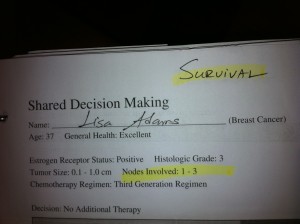January 9th, 2013 §
Elizabeth Edwards reached many people because she was in the public eye, but inspirational people also live quiet lives. We can be inspired by Edwards’s grace and courage as she dealt with the challenging parts of her life in the same way we can find inspirational people around us each and every day. These are all people we can connect with and learn from. In doing so, we better ourselves.
When she was diagnosed with metastatic cancer people told me not to worry: it wouldn’t happen to me just because it happened to her. That’s true. It wouldn’t happen just because it happened to her. But it did happen. And now I look back on everything I’ve said for the past 5.5 years and I am glad I expressed those thoughts as they were happening. Because my fear came true.
…………………………………..
(from December 7, 2010).
I didn’t know Elizabeth Edwards. In fact, I wrote a piece critical of her when she initially stood by John after his affair. I was disappointed when she gave an interview on CNN in May of 2009 and spoke only of John’s “imperfection” rather than calling him the cheater he was and kicking him to the curb. I was angry she hadn’t used her interview time to talk about herself, her cancer, her life: the topics I wanted to hear about. I was angry at her for not claiming her remaining years of life as her own.
So why am I sitting with tears in my eyes because she has died?
I cry because it makes me feel vulnerable and scared of what this disease can do to me: what it did to her.
Yes, I know… there are plenty of men and women who get cancer, have treatment, and stay in remission for the rest of their lives. And, in essence, isn’t that what every cancer patient hopes for, as Betty Rollins wrote, “to die of something else”?
I don’t think it makes me pessimistic, depressing, or negative to think that I am vulnerable.
It’s the truth. It’s my truth.
Anyone who hasn’t been to the oncologist with me to see my risk-of-recurrence charts, my mortality charts, my decision-making discussions along the way can’t say to me “Oh, don’t worry, that won’t be you.” No one, including me, knows how it will go.
People tell me: stay strong, just think positive, you can’t generalize from her situation.
I respond: I am strong, I hope for the best. I don’t think positive thinking is going to save me if there are remaining cancer cells still in me.
I hope that people won’t say to someone who has been diagnosed with cancer, “Don’t worry, what happened to Elizabeth Edwards won’t happen to you.” Because while we do everything we can to ensure we die of something else, it just isn’t always the case. In 2006 her oncologist told her that there were many things going on in her life, “but cancer was not one of them.” Things change quickly, cancer can recur when you least expect it.
I have sympathy for her family. I cry for her children. I am saddened about the years she spent with a man who didn’t deserve her. I am angry about the time she wasted on him. I hoped she would be an example of someone who would keep cancer at bay.
I grieve for that hope, now gone.
December 8th, 2010 §
Today I was interviewed in The Washington Post about my perspective on the news of Elizabeth Edwards’s death. Melissa Bell’s article is entitled “Elizabeth Edwards and the cancer question.” Click on the title to read the piece on the Post website.
Thanks so much to all of you who read the two pieces I wrote about Ms. Edwards and passed them on to friends:
On Resilience and Why I’m Crying.
Your comments mean so much.

December 7th, 2010 §
 Doctors diagnosed my mother with breast cancer the exact same day Elizabeth Edwards heard those words in November, 2004.
Doctors diagnosed my mother with breast cancer the exact same day Elizabeth Edwards heard those words in November, 2004.
Two years later, I too received a diagnosis of breast cancer.
After my diagnosis I went for consultations with two oncologists. Each doctor handed me two pieces of paper displaying bar graphs of the risk of my cancer returning and the risk that I would die from my cancer. These risks were broken down and calculated for four separate conditions: 1) if I did nothing, 2) if I received chemotherapy, 3) if I received hormonal therapy, and 4) if I received “combined” therapy (chemotherapy + hormonal therapy). On the top of the stark white pieces of paper in my doctor’s writing it says “Survival” on one and “Recurrence” on the other.
I made my decision rather easily: to treat my Stage II cancer I opted for a double mastectomy, chemotherapy, and adjuvant hormonal therapy. I had a husband and three young children; I wasn’t taking any chances– I would do whatever it took to get me into remission and give me the best possible chance of survival.
My mother, because of the particulars of her Stage III cancer opted for a lumpectomy, radiation, and chemotherapy.
And so, my mother and I had different treatment plans. But while our treatment protocols differed, we both required the same character trait to get us through: resilience. Appropriately, this is also the title of Elizabeth Edwards’s book.
Resilience has carried me through my mother’s diagnosis and mine. My son Tristan’s surgeries and treatments for congenital spine and hand deformities. The sudden death of my beloved mother-in-law in a car crash one year ago.
Resilience is the ability to bounce back, the ability to find strength and reserves when you think there are none, the guts to wake up each morning and, knowing something else might be just around the corner, say, “Okay, world, bring it on. I can take it.”
It’s also the manner in which you take it. Do you feel defeated? Resigned? Depressed? Angry? Do you channel those negative emotions into something positive?
Some people believe that negative things like cancer and grief are gifts. Books I’ve seen preach that you should change your thinking: these events are not traumas or tragedies; they are gifts, positive intrusions into your life.
I don’t think so.
I don’t think cancer is a gift.
I don’t think grief is an opportunity.
I think these things suck.
I think they hurt.
There’s a difference between thought and action: what you do with those feelings is what counts.
People don’t need to have the same beliefs or think the same way to feel a magnetic pull to one another.
Resilience is like a magnetic pull to life, a force that keeps me coming back for more
with grit,
determination,
heart,
hope.
Resilience whispers in my ear,
“You can do it.
Just keep going.
One foot in front of the other.
It will get better.
And, if it doesn’t, well…
you can take it.
Bring it on.”
Elizabeth Edwards reached many people because she was in the public eye, but inspirational people also live quiet lives. We can be inspired by Edwards’s grace and courage as she dealt with the challenging parts of her life in the same way we can find inspirational people around us each and every day. These are all people we can connect with and learn from. In doing so, we better ourselves. In doing that, we honor their struggle.
My mother is alive, and in remission. And the joy that I feel about having my own mother here is shared in equal measure by the sorrow I feel for Ms. Edwards’s three living children, Catharine, Emma Claire, and Jack, over the loss of their mother.
December 7th, 2010 §
I didn’t know Elizabeth Edwards. In fact, I wrote a piece critical of her when she initially stood by John after his affair. I was disappointed when she gave an interview on CNN in May of 2009 and spoke only of John’s “imperfection” rather than calling him the cheater he was and kicking him to the curb. I was angry she hadn’t used her interview time to talk about herself, her cancer, her life: the topics I wanted to hear about. I was angry at her for not claiming her remaining years of life as her own.
So why am I sitting with tears in my eyes because she has died?
I cry because it makes me feel vulnerable and scared of what this disease can do to me: what it did to her.
Yes, I know… there are plenty of men and women who get cancer, have treatment, and stay in remission for the rest of their lives. And, in essence, isn’t that what every cancer patient hopes for, as Betty Rollins wrote, “to die of something else”?
I don’t think it makes me pessimistic, depressing, or negative to think that I am vulnerable.
It’s the truth. It’s my truth.
Anyone who hasn’t been to the oncologist with me to see my risk-of-recurrence charts, my mortality charts, my decision-making discussions along the way can’t say to me “Oh, don’t worry, that won’t be you.” No one, including me, knows how it will go.
People tell me: stay strong, just think positive, you can’t generalize from her situation.
I respond: I am strong, I hope for the best. I don’t think positive thinking is going to save me if there are remaining cancer cells still in me.
I hope that people won’t say to someone who has been diagnosed with cancer, “Don’t worry, what happened to Elizabeth Edwards won’t happen to you.” Because while we do everything we can to ensure we die of something else, it just isn’t always the case. In 2006 her oncologist told her that there were many things going on in her life, “but cancer was not one of them.” Things change quickly, cancer can recur when you least expect it.
I have sympathy for her family. I cry for her children. I am saddened about the years she spent with a man who didn’t deserve her. I am angry about the time she wasted on him. I hoped she would be an example of someone who would keep cancer at bay.
I grieve for that hope, now gone.



 Link to Twitter
Link to Twitter